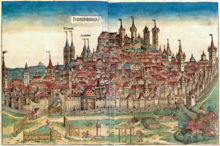
Towns and cities have a long history, although opinions vary on which ancient settlements are truly cities. The benefits of dense settlement included reduced transport costs, exchange of ideas, sharing of natural resources, large local markets, wider selection of potential mates, and in some cases amenities such as running water and sewerage. Possible costs would include higher rate of crime, higher mortality rates, higher cost of living, worse pollution, traffic and high commuting times. Cities grow when the benefits of proximity between people and firms are higher than the cost.[1]
- ^ Bosker, Maarten (2022). "City origins". Regional Science and Urban Economics. 94: 103677. doi:10.1016/j.regsciurbeco.2021.103677.